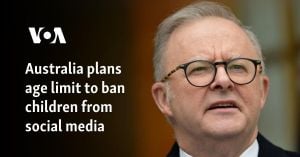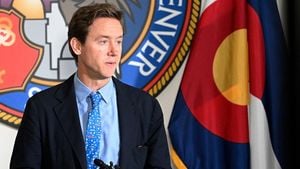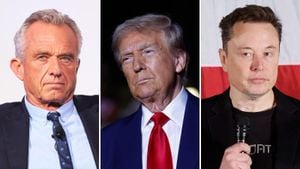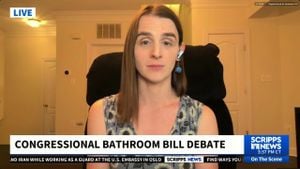California, the frontrunner of the electric vehicle (EV) market, is currently mired in heated debates over its EV incentives, particularly as the political winds shift. Governor Gavin Newsom is stepping up to tackle potential changes following the anticipated moves from President-elect Donald Trump, who plans to eliminate federal consumer tax credits for EVs—a significant policy initiated by the former Biden administration. If Trump goes through with his plans to scrap the $7,500 tax credit, the repercussions could ripple through California's automotive market, which has already established itself as the largest auto market nationwide.
With the possibility of federal subsidies vanishing, Newsom has announced his intent to reinstate California's Clean Vehicle Rebate Project, which had offered similar tax credits before funding was cut off. This rebirth of the rebate program is seen as pivotal by many who advocate for maintaining the state’s momentum toward clean energy. "We're not turning back on a clean transportation future—we're going to make it more affordable for people to drive vehicles {that} don't pollute," Newsom stated emphatically.
Nonetheless, the scenario isn't entirely straightforward. Newsom's proposal may become controversial due to reports indicating Tesla could be excluded from receiving these state-funded incentives. According to internal communications, this exclusion would stem from market-share limitations, as Tesla has become the largest EV manufacturer not just within California but across the country. Elon Musk, the outspoken CEO of Tesla, took to social media to express his outrage, calling the notion "insane," especially since Tesla is the only company manufacturing EVs directly within California’s borders. His passionate response highlights the mix of confusion and anger swirling around this potential legislative change.
Adding to the complexity, the automotive industry’s influential lobby group, the Alliance for Automotive Innovation, has reached out to Trump, urging him to retain the federal tax credit. They argue the subsidies are necessary for boosting sales of electric vehicles at a time when fostering the EV market has become increasingly urgent.
At stake is not just California's current EV tax credit scheme but the broader future of the EV industry as the state grapples with the potential loss of federal support. The auto lobby’s ability to sway Trump’s administration, coupled with the competitive dynamics of state policies, could reshape how incentives are structured moving forward. The lobbying efforts from the automobile sector are predicated on the belief so many advancements hinge on these rebates.
Unexpectedly, the political confrontation could trigger what some analysts describe as potential fragmentation within the EV market itself. If federal subsidies vanish entirely, we may witness other liberal states stepping up to provide their own incentives. This could lead to uneven playing fields where the varying levels of incentives create competitive imbalances among automakers across different states.
With the possible emergence of reduced federal participation, observers are puzzled. How will the varying interests of California's EV sector play out, especially considering the state has consistently championed the rise of electric transportation? AB 32 and the longer-term goals under California’s cap-and-trade program play heavily as factors within this multifaceted debate.
Reactions to Newsom’s announcements have arrived from numerous sectors. Some social media users have praised his possible exclusion of Tesla from the rebates, framing it as a necessary step toward fair competition. This reaction pits the community of EV advocates who support the accelerative forces behind green energy against critics who fear the decision could damage California's homegrown industry.
House Republican Ro Khanna, who repped Tesla's manufacturing heartland, criticized the potential exclusion plan. He highlighted Tesla's massive impact within his district, indicating any such move might endanger manufacturing jobs and undermine the local economy. "Let's not play politics with keeping manufacturing {in} California," he tweeted, supporting Tesla's role as a key player.
Meanwhile, industry experts are holding their breaths. The upcoming legislative debates are poised to be aggressive, especially as Newsom will have to ally with state legislators amid financial pressures. The size of the rebates under his new plan remains indeterminate, raising many questions about implementation and feasibility.
What’s clear is this: California's EV initiative is under significant pressure. With Trump’s administration signaling moves against federal rebates and Newsom teetering between protectionism and inclusivity, the road ahead may see both drivers and manufacturers adjusting to new realities.
Having previously clashed with Musk over state pandemic rules, Governor Newsom's relationship with Tesla has faced growing scrutiny. Merging politics and environmental policies has rarely been smooth, and with Musk’s unpredictable stances on government support—historically, he has both supported and opposed federal subsidies—this existing feud may very well color future negotiations. Now, with debates looming over the Clean Vehicle Rebate Project, all eyes remain on Sacramento and Washington, D.C., as incentives hang precariously in the balance.



